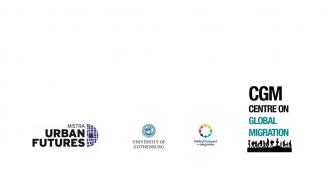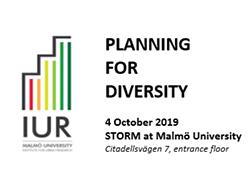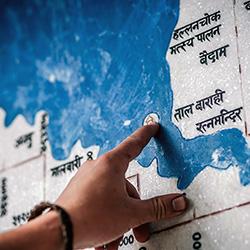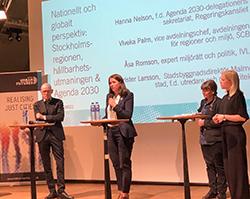
A Global Compact for Migration: What’s next?
A hearing on what the Global Compact for Migration implies for cities and regions
16 May 2019
In a globalized world, migration is an inextricable part of social, cultural, economic, political and technological transformations. More people in more parts of the world migrate or seek to migrate today than ever before, and mobility itself has become an important stratifying factor. Consequently, migration has a huge impact on a large number of people’s living conditions.
The event was livestreamed here
Time: 8.30 –13.15, the 16th of May, 2019
Location: Sappören/ Faculty of Social Science/ University of Gothenburg, Sprängkullsgatan 25, Gothenburg
The number of international migrants in the world reached 258 million in 2018 for the world as a whole. This number is expected to grow as migration pressures, created by the development gaps between poor and rich countries, fuelled by the process of globalization and demographic dynamics, will result in further migration. Wars and violence continue to displace people across borders and within their own countries. Also, internal migration from rural to urban settings is evident in the explosive growth of major cities across the globe, with implications for urban environments, development and poverty. As a result, there is a growing interest from governments, organizations, civil society, the private sector and many other groups affected by migration, to look further into how the benefits of migration can be maximized, while minimizing it’s negative effects.
In December 2018, 164 nations adopted a pact to understand and manage global migration as a joint endeavour. The Global Compact for Safe, Orderly and Regular Migration (GCM) is the first intergovernmental agreement that covers all dimensions of global migration, from countries of departure to countries of arrival, and hence highlights migration as multi-national responsibility. With its comprehensive approach to migrants and migration, the Global Compact for Migration provides both opportunities and challenges. The Compact must be implemented on many levels. This is to be done by states and local governments in co-operation and partnership with a wide range of non-state institutions and stakeholders. Likewise, new research is needed asked for. The purpose of this hearing is to bring together experts with insights of the GCM together with representatives from across these actors and sectors to discuss the impact and implementation of the GCM.
Among others, the following questions will be discussed; why do we need a new international agreement on migration? How does the GCM relate to the existing international legal system for refugees and migrants? What are the challenges in implementing the GCM on the national and the local level? What could the compact mean for the urban development of cities and regions in Sweden? What tangible difference will the compact make in the lives of migrants or the communities that host them?
We welcome you to a half day’s hearing to learn about and engage in the impact of the Global compact for Migration.
Henrietta Palmer, deputy scientific director Mistra Urban Futures, Andrea Spehar, director of Centre for on Global Migration, Gothenburg University of Gothenburg, Helene Holmström, Head of operations/ Integration, City of Gothenburg.
Read more about the Global Compact
See the video-clip and interviews from the hearing in May.
Download and read the documentagreement: Global Compact for safe, orderly and regular migration
Time: 8.30 –13.15, the 16th of May, 2019
Link for registration: Register here follow the link, on the bottom of the links site there is a formula where you register. Or register directly here Last day to register: 10 May.
Programme:
8.30 – 9.00 Coffee and registration
9.00 – 9.15 Welcome and introduction
9.15 – 9.45 The Global Compact and international migration law: is there an added value? Professor Gregor Noll, University of Gothenburg, Gothenburg
9.50 – 10.20 Local and regional challenges related to integration and introduction of newly arrived immigrants. Birgitta Guevara, Immigrant Integration Department, County Administrative Board of Västra Götaland.
Short health break
10.40 – 11.10 The Global Compact for Migration: Opportunities and obligations for the social and environmental sciences. Professor Ellen Percy Kraly, Malmö University and Colgate University, NY.
11.15 –12.15 Panel with speakers, together with Helen Holmström. Moderator Andrea Spehar.
12.15 –13:15 Light lunch, mingle
Short bios
Gregor Noll
is a professor of International Law and has been recently appointed to a chair at the School of Business, Economics and Law at Gothenburg University of Gothenburg after holding the chair of international law at Lund University between 2005 and 2018. His research covers themes as migration law, the law of armed conflict and the theory of international law. With a group of junior and mid-career research fellows, he transformed Lund into a brand for interdisciplinary research in international law. Noll held the prestigious Pufendorf Chair at Lund University from 2012 to 2016 and co-launched the Gothenburg/Lund/Uppsala Migration Law Research Network in 2011.
Birgitta Guevara
has worked with issues related to integration and segregation for almost twenty years, first within the City of Gothenburg, later at the Public Employment Service, and for the last ten years within the County Administrative Board of Västra Götaland. Guevara has also participated as a practitioner in a transdisciplinary research project with focus on social sustainability and has worked with segregation issues at the Government Office and at the newly inaugurated Anti-segregation Authority (Delegationen mot segregation).
Ellen Percy Kraly
holds the William R. Kenan, Jr. Professor of Geography and Environmental Studies at Colgate University. During 2019, she is serving as the Willy Brandt Guest Professor in International Migration and Ethnic Relations, Malmo University. She was awarded an honorary doctorate from Curtin University, Perth, Australia recognizing her work to return Aboriginal artwork to Western Australia. She is Chair of the Scientific Panel on International Migration of the International Union for the Scientific Study of Population and is organizing a workshop on the demography of refugees for the U.S. National Academy of Sciences. She is former editor of the International Migration Review. Her published scholarship has addressed the demography of refugee and forced migration, relationship between immigration and US population and environment, emigration, international migration statistics, immigrant incorporation, and population data systems and human rights.
Contact:
henrietta.palmer@chalmers.se
andrea.spehar@pol.gu.se








